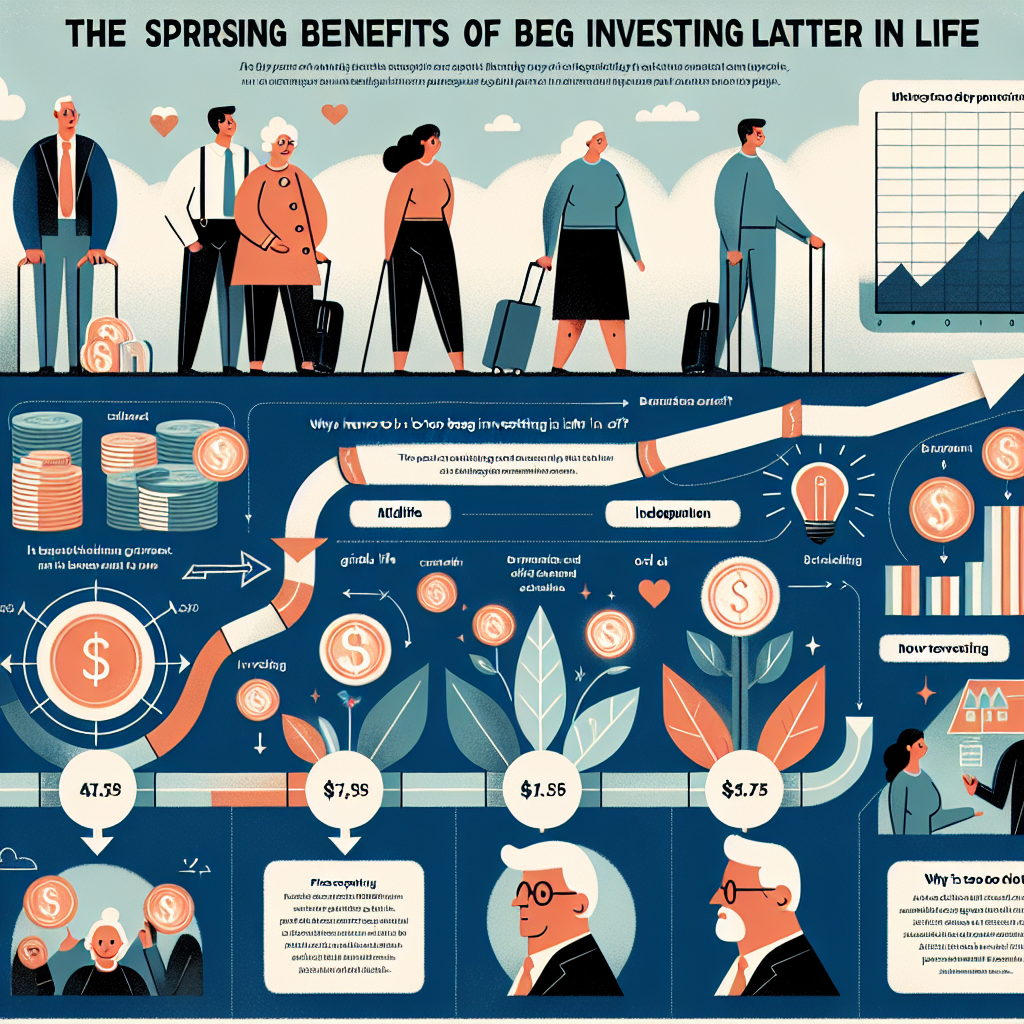-
Table of Contents
- The Surprising Benefits of Starting Your Investment Journey Later in Life
- Financial Stability and Higher Disposable Income
- Higher Disposable Income
- Experience and Knowledge
- Understanding Market Cycles
- Access to Better Investment Opportunities
- Real Estate Investments
- Tax Advantages and Retirement Accounts
- Catch-Up Contributions
- Reduced Financial Responsibilities
- Empty Nest Syndrome
- Psychological and Emotional Readiness
- Greater Emotional Resilience
- Case Studies and Real-Life Examples
- Case Study: Warren Buffett
- Example: Late Bloomers in Real Estate
- Conclusion
The Surprising Benefits of Starting Your Investment Journey Later in Life

Investing is often touted as a young person’s game, with financial advisors and experts emphasizing the importance of starting early to take advantage of compound interest. However, starting your investment journey later in life can also offer unique advantages that are often overlooked. This article delves into the surprising benefits of beginning to invest later in life, supported by relevant examples, case studies, and statistics.
Financial Stability and Higher Disposable Income
One of the most significant advantages of starting your investment journey later in life is financial stability. By the time you reach your 40s or 50s, you are likely to have a more stable income and fewer financial obligations compared to your younger years. This stability allows for more strategic and less risky investment decisions.
Higher Disposable Income
As you progress in your career, your income generally increases. With higher earnings, you have more disposable income to allocate towards investments. This can lead to substantial investment contributions, even if you start later.
- Increased salary and bonuses
- Fewer student loans and other debts
- Potentially lower childcare costs
For example, a 50-year-old professional earning $100,000 annually can afford to invest a larger portion of their income compared to a 25-year-old earning $50,000. This higher disposable income can significantly accelerate the growth of your investment portfolio.
Experience and Knowledge
With age comes wisdom, and this is particularly true in the realm of investing. By starting later in life, you bring a wealth of experience and knowledge that can be invaluable in making informed investment decisions.
Understanding Market Cycles
Having lived through various economic cycles, you are likely to have a better understanding of market fluctuations and how to navigate them. This experience can help you make more informed decisions and avoid common pitfalls that younger investors might encounter.
- Experience with past market crashes and recoveries
- Better understanding of economic indicators
- Ability to identify long-term trends
For instance, someone who has experienced the dot-com bubble, the 2008 financial crisis, and the COVID-19 pandemic is likely to have a more nuanced understanding of market volatility and risk management.
Access to Better Investment Opportunities
Starting your investment journey later in life can also provide access to better investment opportunities. With a more substantial financial foundation, you can explore a wider range of investment options that may not have been available to you earlier.
Real Estate Investments
Real estate is a prime example of an investment opportunity that often requires significant capital. By starting later in life, you may have the financial means to invest in real estate, which can offer substantial returns and diversification benefits.
- Rental properties
- Commercial real estate
- Real estate investment trusts (REITs)
For example, a 55-year-old investor with a solid financial foundation might be able to purchase a rental property, generating a steady stream of passive income and potential appreciation over time.
Tax Advantages and Retirement Accounts
Starting your investment journey later in life can also offer unique tax advantages, particularly when it comes to retirement accounts. Understanding and leveraging these benefits can significantly enhance your investment returns.
Catch-Up Contributions
For individuals aged 50 and older, the IRS allows for catch-up contributions to retirement accounts such as 401(k)s and IRAs. These additional contributions can help you accelerate your retirement savings.
- 401(k) catch-up contribution limit: $6,500 (2023)
- IRA catch-up contribution limit: $1,000 (2023)
For example, a 52-year-old investor can contribute up to $27,000 annually to their 401(k) ($20,500 standard limit + $6,500 catch-up contribution), significantly boosting their retirement savings.
Reduced Financial Responsibilities
As you age, your financial responsibilities often decrease. Children may become financially independent, mortgages may be paid off, and other debts may be settled. This reduction in financial obligations can free up more resources for investing.
Empty Nest Syndrome
With children moving out and becoming financially independent, you may find yourself with more disposable income. This can be redirected towards investments, allowing you to build a robust portfolio even if you start later in life.
- Reduced education expenses
- Lower household costs
- Increased ability to save and invest
For instance, a couple in their 50s with grown children may find themselves with an extra $1,000 per month that was previously spent on childcare and education. This additional income can be invested to grow their wealth.
Psychological and Emotional Readiness
Investing requires a certain level of psychological and emotional readiness. Starting your investment journey later in life can mean you are more prepared to handle the emotional ups and downs of investing.
Greater Emotional Resilience
With age, you are likely to have developed greater emotional resilience and a better understanding of your risk tolerance. This can help you stay the course during market volatility and avoid making impulsive decisions.
- Better stress management
- Increased patience and long-term perspective
- Improved decision-making skills
For example, a 60-year-old investor may be less likely to panic-sell during a market downturn compared to a younger, less experienced investor. This emotional resilience can lead to better long-term investment outcomes.
Case Studies and Real-Life Examples
To illustrate the benefits of starting your investment journey later in life, let’s look at some real-life examples and case studies.
Case Study: Warren Buffett
Warren Buffett, one of the most successful investors of all time, made the majority of his wealth after the age of 50. While he started investing at a young age, his wealth truly skyrocketed later in life due to the power of compound interest and his disciplined investment approach.
- At age 50, Buffett’s net worth was approximately $67 million.
- By age 60, his net worth had grown to $3.8 billion.
- Today, Buffett’s net worth exceeds $100 billion.
This case study demonstrates that significant wealth can be accumulated later in life, even if you start with a modest investment portfolio.
Example: Late Bloomers in Real Estate
Consider the example of John and Mary, a couple in their late 50s who decided to invest in real estate. With their children financially independent and their mortgage paid off, they had extra income to invest. They purchased a rental property, which now generates a steady stream of passive income and has appreciated in value over time.
- Initial investment: $300,000
- Annual rental income: $24,000
- Property value appreciation: 5% per year
John and Mary’s late start in real estate investing has provided them with financial security and additional income for their retirement years.
Conclusion
While starting your investment journey early has its advantages, beginning later in life offers unique benefits that should not be underestimated. Financial stability, higher disposable income, experience, access to better investment opportunities, tax advantages, reduced financial responsibilities, and greater emotional readiness all contribute to the potential for successful investing later in life.
By leveraging these advantages, individuals who start investing later can still build substantial wealth and achieve their financial goals. Whether you are in your 40s, 50s, or beyond, it is never too late to start your investment journey and reap the rewards of smart financial planning.
In summary, the key takeaways are:
- Financial stability and higher disposable income allow for more substantial investment contributions.
- Experience and knowledge provide a better understanding of market cycles and investment strategies.
- Access to better investment opportunities, such as real estate, can enhance portfolio growth.
- Tax advantages, such as catch-up contributions, can accelerate retirement savings.
- Reduced financial responsibilities free up resources for investing.
- Psychological and emotional readiness can lead to better long-term investment outcomes.
Ultimately, starting your investment journey later in life can be a strategic and rewarding decision, offering numerous benefits that can help you achieve financial success and security.








